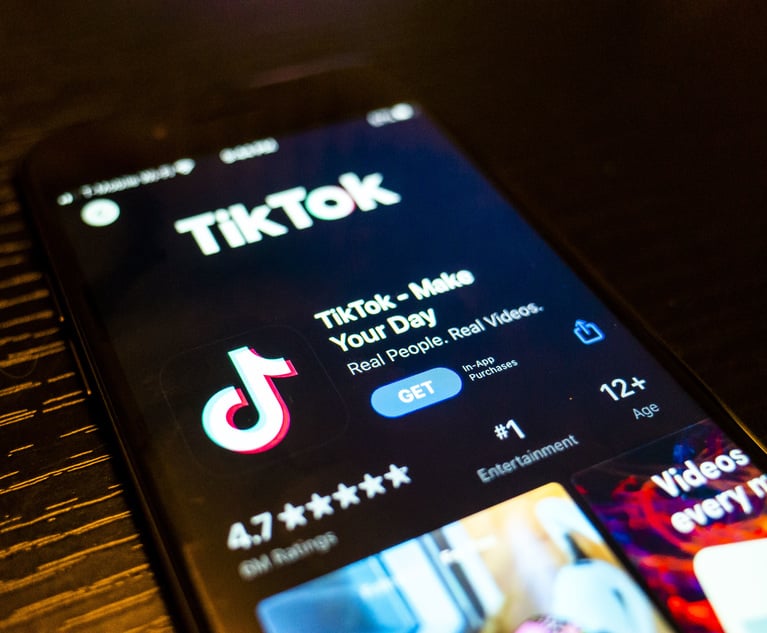GSU Law Starts Big Data Lab as Industry Girds for Disruption
An ambitious project by GSU law professor Charlotte Alexander evolved into the Legal Analytics Lab, which she calls an incubator to "see what's possible."
October 17, 2017 at 05:07 PM
7 minute read

With big data poised to shake up the legal industry, Georgia State University College of Law is getting into the data analytics business.
GSU Law has launched a Legal Analytics Lab to apply big data to law—unearthing patterns in civil litigation, patent filings and corporate compliance disclosures to shed light on legal questions and predict future outcomes in ways that earlier generations of lawyers could not have imagined.
A few other law schools have also started legal analytics labs, but the GSU Law lab's director, Charlotte Alexander, said its focus on real-world applications makes it unique.
The Legal Analytics Lab is housed at GSU's Institute for Insight, which is the J. Mack Robinson College of Business's own data analytics lab, started in 2015. Companies and law firms can engage GSU law professors and data scientists to test out proof-of-concept data analysis projects, called “sprints,” said Alexander, a professor at GSU's business and law schools who studies employment law.
“The sprints are a learning opportunity for our students and a way for a company to see that it's possible to do with the data they do have,” she explained.
By working on the sprints, law students can learn data science skills for the legal jobs of the future—an important part of the lab's mission. “We are at the beginning of a real disruption in the way firms practice law and the way legal research is done,” Alexander said.
The lab germinated from a legal research project in which Alexander is analyzing federal district court judges' decisions since 2008 in worker misclassification cases—a timely issue in light of numerous plaintiffs employment suits brought by “gig” workers challenging their classification as contractors by Uber, Amazon, FedEx and other big players in the flexible new world of work.
She enlisted a data scientist, Javad Feizollahi, at the Institute for Insight to help. Alexander realized there were plenty of other legal analysis projects that GSU law professors and data scientists could undertake, and so she enlisted colleagues to “create an incubator at GSU for this type of research and see what's possible.”
Other GSU Law professors working with the lab are Timothy Lytton, Jonathan Todres, Anne Tucker and Doug Yarn.
Right now the lab is working on a sprint for an insurance company that offers director and officer liability coverage, Alexander said. The insurer is mining the text of securities complaints and corporate disclosures to predict the likelihood of securities litigation that could affect its clientele.
Another project is identifying financial technology patent applications and tracking their impact on the financial services industry.
Big Law Takes Note
The lab is already attracting interest from law firms such as Seyfarth Shaw. Brett Bartlett, who heads its Atlanta labor and employment group, sees mining the lab's database of federal employment cases for predictive patterns as a high-tech way to help clients mitigate risk.
He and Kevin Young, another Seyfarth partner in the group, are talking to Alexander about analytics projects that could help their clients spot compliance problems, head off of employment claims and reduce the uncertainty and expense of litigation. “Any time you have employment claims made, it creates operational drag,” Bartlett said.
Seyfarth is considering looking at all federal employment cases nationally and “determining on a granular level, down to the judge, where problems arise under Title VII [prohibiting employment discrimination]—or any employment law,” Bartlett said—useful to a client with 50 single-plaintiff Title VII cases in different jurisdictions.
“The list of what we might dig into is endless,” Young said, adding that the data could help them advise clients on litigation tactics. “We could create modeling for when to settle, for how much—or if the case should go to trial.”
There's an Algorithm for That
Alexander's interest in automating data analytics sprang from her inquiry into the factors that cause judges to decide whether a worker is an employee or a contractor.
U.S. labor and employment laws leave a lot of grey area in distinguishing between the two, she explained, so analyzing judges' opinions sheds light on what criteria federal district courts use to draw the line—an important distinction, since only employees receive legal protections against job discrimination, overtime wage rights and other benefits.
“I basically wanted to find out more about how judges apply the law in employment cases, and I felt I could do it more quickly and efficiently if I could automate the process,” Alexander said.
Instead of using law students to code the text of opinions, as she had done for past projects, Alexander said she wondered if she could “get an algorithm to do it.”
She and Feizollahi, the GSU data scientist, won an almost $250,000 grant from the Department of Labor to develop a massive database of federal judge's opinions from PACER, the government repository of federal cases.
Existing legal research services like Westlaw and LexisNexis have databases of court documents, but Alexander said their terms of service do not allow for machine-searching or sharing downloaded document sets.
Instead, she and Feizollahi partnered with the Free Law Project in Emeryville, California, which makes PACER documents publicly available. The GSU project added 3.4 million orders and opinions from 1.5 million federal district and bankruptcy court cases to the nonprofit's RECAP collection.
After mining misclassification opinions from PACER, the team created algorithms to tally judges' use of classification criteria—for instance how many times an opinion mentions “tools,” since a worker using their own tools is one criterion for a contractor.
An algorithm can also identify characteristics that a group of opinions, such as those classing workers as employees, have in common, she said.
“That is what I think is particularly exciting here,” Alexander said. “There might be factors that we're missing—so the algorithm can give us new insights into legal documents.”
No two cases are the same, she cautioned. “We are not at the point where we can just feed in a set of variables and come up with a prediction. We're talking about judges. They're not robots.”
“But it's a good tool for the toolkit,” she added.
Mapping Plaintiffs Networks
Alexander is working on another project to map the networks among plaintiffs lawyers who've filed wage and hour suits under the Fair Labor Standards Act.
“I want to see if we can map links among cases and lawyers to understand why FLSA litigation has boomed—and in certain jurisdictions more than others,” she said.
“Employers are worried about this. They're buying insurance against it,” Alexander added.
Tracking plaintiffs suits is useful, she said, because, unlike the heavily regulated European model, “so many of our rights and protections are not enforced by the government but by plaintiffs lawyers.”
The U.S. system “relies on people who are harmed to identify that harm and go to court,” Alexander said, so she's interested in figuring out what factors make it more likely for people to sue and how judges apply the law in court.
Mapping plaintiffs' lawyers networks is a way to examine their role as “the intermediary between the worker and the court system,” she said.
“If we want to get to know better how our litigation-based system of enforcement is working, we need to do more than just read individual cases,” Alexander said.
This content has been archived. It is available through our partners, LexisNexis® and Bloomberg Law.
To view this content, please continue to their sites.
Not a Lexis Subscriber?
Subscribe Now
Not a Bloomberg Law Subscriber?
Subscribe Now
NOT FOR REPRINT
© 2025 ALM Global, LLC, All Rights Reserved. Request academic re-use from www.copyright.com. All other uses, submit a request to [email protected]. For more information visit Asset & Logo Licensing.
You Might Like
View All
Bojangles Restaurant Chain Faces Several Lawsuits Following Data Breach

'Cradle to Grave': Children's Clothing Company Carter's Sued in Digital Privacy Class Action

Hall Booth Smith Experiences Data Breach—Here's What You Need to Know to Protect Your Firm's Data

Georgia Lawyers Speak at Conference Session Focusing on Rise of Collaboration Apps
4 minute readTrending Stories
- 1SurePoint Acquires Legal Practice Management Company ZenCase
- 2Day Pitney Announces Partner Elevations
- 3The New Rules of AI: Part 2—Designing and Implementing Governance Programs
- 4Plaintiffs Attorneys Awarded $113K on $1 Judgment in Noise Ordinance Dispute
- 5As Litigation Finance Industry Matures, Links With Insurance Tighten
Who Got The Work
J. Brugh Lower of Gibbons has entered an appearance for industrial equipment supplier Devco Corporation in a pending trademark infringement lawsuit. The suit, accusing the defendant of selling knock-off Graco products, was filed Dec. 18 in New Jersey District Court by Rivkin Radler on behalf of Graco Inc. and Graco Minnesota. The case, assigned to U.S. District Judge Zahid N. Quraishi, is 3:24-cv-11294, Graco Inc. et al v. Devco Corporation.
Who Got The Work
Rebecca Maller-Stein and Kent A. Yalowitz of Arnold & Porter Kaye Scholer have entered their appearances for Hanaco Venture Capital and its executives, Lior Prosor and David Frankel, in a pending securities lawsuit. The action, filed on Dec. 24 in New York Southern District Court by Zell, Aron & Co. on behalf of Goldeneye Advisors, accuses the defendants of negligently and fraudulently managing the plaintiff's $1 million investment. The case, assigned to U.S. District Judge Vernon S. Broderick, is 1:24-cv-09918, Goldeneye Advisors, LLC v. Hanaco Venture Capital, Ltd. et al.
Who Got The Work
Attorneys from A&O Shearman has stepped in as defense counsel for Toronto-Dominion Bank and other defendants in a pending securities class action. The suit, filed Dec. 11 in New York Southern District Court by Bleichmar Fonti & Auld, accuses the defendants of concealing the bank's 'pervasive' deficiencies in regards to its compliance with the Bank Secrecy Act and the quality of its anti-money laundering controls. The case, assigned to U.S. District Judge Arun Subramanian, is 1:24-cv-09445, Gonzalez v. The Toronto-Dominion Bank et al.
Who Got The Work
Crown Castle International, a Pennsylvania company providing shared communications infrastructure, has turned to Luke D. Wolf of Gordon Rees Scully Mansukhani to fend off a pending breach-of-contract lawsuit. The court action, filed Nov. 25 in Michigan Eastern District Court by Hooper Hathaway PC on behalf of The Town Residences LLC, accuses Crown Castle of failing to transfer approximately $30,000 in utility payments from T-Mobile in breach of a roof-top lease and assignment agreement. The case, assigned to U.S. District Judge Susan K. Declercq, is 2:24-cv-13131, The Town Residences LLC v. T-Mobile US, Inc. et al.
Who Got The Work
Wilfred P. Coronato and Daniel M. Schwartz of McCarter & English have stepped in as defense counsel to Electrolux Home Products Inc. in a pending product liability lawsuit. The court action, filed Nov. 26 in New York Eastern District Court by Poulos Lopiccolo PC and Nagel Rice LLP on behalf of David Stern, alleges that the defendant's refrigerators’ drawers and shelving repeatedly break and fall apart within months after purchase. The case, assigned to U.S. District Judge Joan M. Azrack, is 2:24-cv-08204, Stern v. Electrolux Home Products, Inc.
Featured Firms
Law Offices of Gary Martin Hays & Associates, P.C.
(470) 294-1674
Law Offices of Mark E. Salomone
(857) 444-6468
Smith & Hassler
(713) 739-1250






